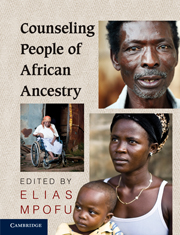Book contents
- Frontmatter
- Contents
- Contributors
- About the Editor
- Editorial Board
- Foreword
- Preface
- Acknowledgments
- PART 1 FOUNDATIONS OF COUNSELING IN AFRICAN SETTINGS
- 1 Indigenous Healing Practices in Sub-Saharan Africa
- 2 The Role of the Oral Tradition in Counseling People of African Ancestry
- 3 Assessment for Counseling Intervention
- 4 Research on Counseling in African Settings
- 5 Deconstructing Counseling Psychology for the African Context
- 6 Racial Oppression, Colonization, and Identity: Toward an Empowerment Model for People of African Heritage
- PART 2 CONTEXTS OF COUNSELING
- PART 3 COUNSELING APPLICATIONS
- PART 4 THE FUTURE OF COUNSELING IN AFRICAN HERITAGE SETTINGS
- Counseling People of African Ancestry Multiple Choice Answers
- Index
1 - Indigenous Healing Practices in Sub-Saharan Africa
Published online by Cambridge University Press: 05 August 2011
- Frontmatter
- Contents
- Contributors
- About the Editor
- Editorial Board
- Foreword
- Preface
- Acknowledgments
- PART 1 FOUNDATIONS OF COUNSELING IN AFRICAN SETTINGS
- 1 Indigenous Healing Practices in Sub-Saharan Africa
- 2 The Role of the Oral Tradition in Counseling People of African Ancestry
- 3 Assessment for Counseling Intervention
- 4 Research on Counseling in African Settings
- 5 Deconstructing Counseling Psychology for the African Context
- 6 Racial Oppression, Colonization, and Identity: Toward an Empowerment Model for People of African Heritage
- PART 2 CONTEXTS OF COUNSELING
- PART 3 COUNSELING APPLICATIONS
- PART 4 THE FUTURE OF COUNSELING IN AFRICAN HERITAGE SETTINGS
- Counseling People of African Ancestry Multiple Choice Answers
- Index
Summary
OVERVIEW. Healers seek to help patients understand the sociocultural basis of their health conditions, and how they can recognize, activate, or utilize resources and/or support systems necessary to alleviate their suffering. Treatment modalities include relaxation techniques, use of herbs, psychocultural education, dream interpretation, storytelling, use of proverbs, cleansing, libation, music, and ceremonies. In this chapter, we consider the importance of indigenous healing systems, history of research into traditional health care in Africa, national and international influences on African indigenous healing systems, current practices, legal and professional issues, and issues for research on African indigenous healing systems.
LEARNING OBJECTIVES
By the end of the chapter, the reader should be able to:
Define indigenous healing.
Outline traditionalist African core beliefs about health and well-being.
Discuss the major approaches and techniques to healing by indigenous healers and their rationale.
Differentiate among consultation procedures with African indigenous healers.
Evaluate prospective areas of research that would advance knowledge of African indigenous healing systems.
INTRODUCTION
Through the ages, human societies have developed systems for responding to health problems and for improving the quality of life. As evidence, every region of the world has a form of traditional or indigenous healing system, either formal or nonformal (Gielen, Fish, & Draguns, 2004; Harley, 2006). The World Health Organization (WHO, 1978, 2001) defined traditional healing as knowledge and practices, whether explicable or not, used in the diagnosis, prevention, and elimination of physical, mental, and social imbalance and relying exclusively on practical experiences and observations handed down from generation to generation, mostly verbally, but also, to some limited extent, in writing.
- Type
- Chapter
- Information
- Counseling People of African Ancestry , pp. 3 - 21Publisher: Cambridge University PressPrint publication year: 2011
- 30
- Cited by



